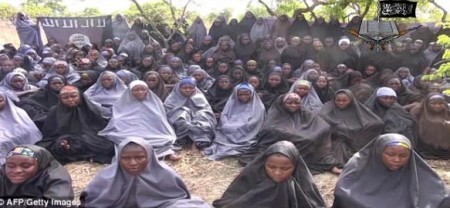The Federal Government of Nigeria and Muslim fundamentalist group Boko Haram have put pen to paper to a ceasefire agreement in Chad that could see over 200 schoolgirls abducted in April returned to their families.

The militants caused outrage throughout the world when they stormed a school in the remote northeastern village of Chibok, where they snatched about 270 girls. The girls, who were subsequently paraded in videos posted to YouTube dressed in modest Islamic attire while guarded by armed masked rebels, have since been held at secret locations. A group of fifty-seven succeeded in an escape bid, but more than 200 are still being held.
The mass abduction was just one of several atrocities enacted by masked militants, including the razing of schools and murder of students. Boko Haram contend that girls should not favour school over preparedness to become a good wife.
The ceasefire agreement was announced by the Chief of Defence Staff, Air Chief Marshal Alex Badeh at the end of the two-day Coordinating Conference on Cameroon-Nigeria Trans-border Military Operations at the Defence Intelligence Headquarters in the Nigerian capital, Abuja on October 17, according to This Day.
“Without any prejudice to the outcome of our three-day interactions and the conclusions of this forum, I wish to inform this audience that a ceasefire agreement has been concluded between the federal government of Nigeria and the Ahlul Sunna Li Daawa Wal Jihad”, the Chief of Defence Staff said, adding that, “I have accordingly directed the service Chiefs to ensure immediate compliance with this development in the field.”
The Director of Defence Information Major General Chris Olukolade confirmed the signing of the ceasefire agreement and stated that details and further clarification would come from the Presidency.
The senior special public affairs assistant to President Goodluck Jonathan, Dr. Doyin Okupe said: “The Federal Government has reached an agreement of a ceasefire with the leaders of the Boko Haram and in full compliance with this, has directed the military to respect the ceasefire.”
Okupe also raised hopes that the kidnapped Chibok schoolgirls may be released next week when he said, “The implementation of this ceasefire was signed today and further agreements on this deal, including the release of the kidnapped Chibok girls, are part of this agreement. Discussions and negotiations started several months ago.”
Without citing the names of officials who signed the agreement, Okupe said: “The entire agreement is being handled in utmost confidentiality and the Chadians involved are full of hope that the deal will work out and the details of this agreement will be fully complied with.”
Despite the supposed ceasefire, there have been waves of attacks in Borno and Adamawa states, including one on Sunday evening in Damboa, southwest of Maiduguri, where soldiers fought militants thought to represent Boko Haram.
A senior military source, speaking on condition of anonymity, said on Monday that troops killed at least 35 insurgents as they tried unsuccessfully to ransack the town.
Rocket-propelled grenades, machine guns and explosives were recovered after the fighting, which lasted from 7:00 pm on Sunday (1800 GMT) to the early hours of Monday.
Separately, witnesses in northern Borno reported that a significant number of people fleeing weekend clashes drowned while trying to cross the Kumadugu-Yobe river that serves as a border with neighbouring Niger, but casualty figures were not immediately clear.
The Borno Elders Forum, which last month warned that Boko Haram had surrounded Maiduguri and were preparing to take over, suggested Abuja had not negotiated with the entire group.
“If the Federal Government does not know who the real Boko Haram are, I think they should come here to find out from us,” Gubio said, adding: “The real Boko Haram who are killing us, who are burning our towns and villages, are not the Boko Haram that a peace deal was reached with.”










